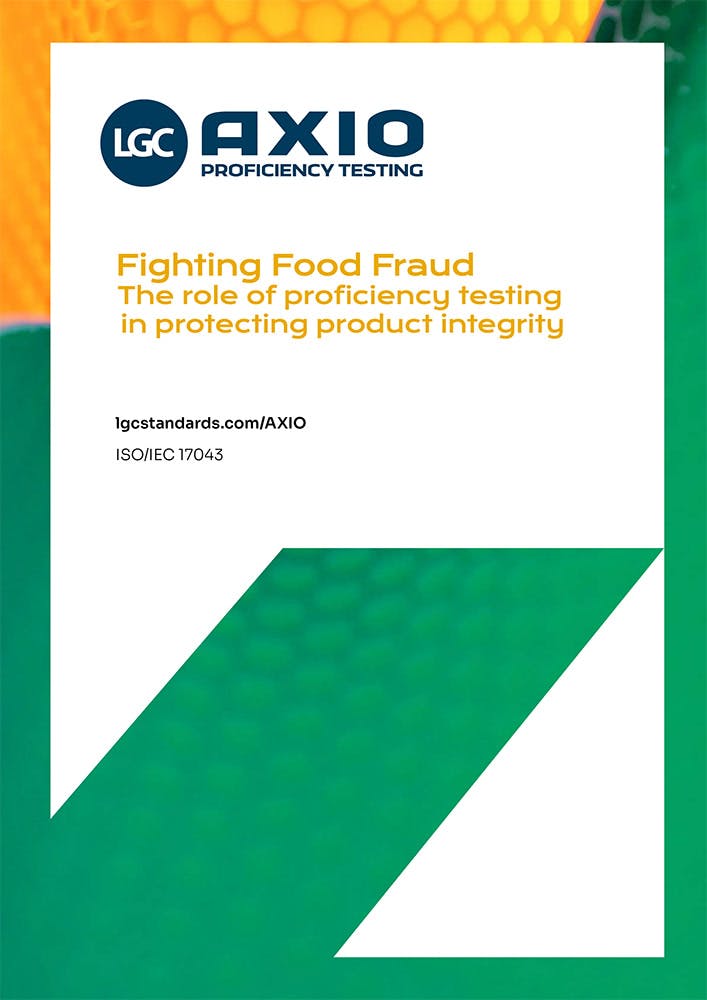Fighting the scale and impact of food fraud.
Increasingly sophisticated fraudulent practices and the complexity of global supply chains is increasing the demand for greater vigilance and product testing. AXIO and BRCGS help to support these initiatives and provide greater assurance.
16 May 2022

Share this article
In a global food market that generates annual revenues in excess of $6,000bn, incentives for businesses and individuals to commit food fraud are high.
Defined as “intentionally causing a mismatch between food product claims and food product characteristics”, usually for profitable gain, food fraud is a deliberate, economically motivated activity. This differentiates it from food integrity or food authenticity.
Food fraud is commonly associated with ‘economically motivated adulteration’ – the intentional substitution or addition of a substance for the purpose of increasing the value or reducing the cost of food production, to generate increased profit. Other types of food fraud include:
Substitution
Dilution (e.g. olive oil diluted with other oils)
Simulation (e.g. fake copy of popular product)
Counterfeiting and misrepresentation
800% rise in detected fraud associated with honey and other sweeteners (since COVID)
Food fraud has far-reaching consequences
The increasing complexity of global food supply chains affords fraudsters greater opportunities to commit fraud with relatively low probability of being caught. Combine this with the increasing level of sophistication being deployed in fraudulent practices, and it’s easy to understand why authorities, regulators and analytical scientists find it difficult to maintain pace with and identify such practices.
Food fraud has far-reaching consequences. Those seeking to protect the integrity of the food chain and marketplace are not only attempting to protect consumers from being misled or from consuming potentially harmful food items (see Natasha’s Law article). They’re simultaneously trying to protect businesses from losing revenue to criminal practices and protect the rights and traditional practices of producers.
Foods such as dairy products, olive oil, honey, coffee, herbs and spices, meat and fish are common targets for fraudsters because of their high commercial value.
In a white paper published last year, LGC Assure brand AXIO cited research that stated the Covid-19 pandemic has caused a dramatic increase in food fraud events – including an 800% rise in detected fraud associated with honey and other sweeteners.
In an operation targeting food and drink fraud jointly organised in 2019 by Europol and Interpol, fraudulent products ranging from alcohol to cereals and grains, meat and other fake food products were detected and blocked from entering supply chains:
16,000 tonnes of unsafe products
30m+ litres of unsafe liquids
€100m estimated worth of goods
In India, the Food Safety and Standards Authority analysed more than 100,000 samples of food in 2018-19 with unsettling results:
3.7% of products were deemed unsafe
16% were of a lower standard than expected
9% of products were mislabelled
With fraudsters around the world becoming more technologically savvy and using increasingly sophisticated approaches to adulterate food, there’s corresponding pressure to increase vigilance in food testing and the protection of supply chains.
The role of proficiency testing in protecting product integrity
Analytical laboratories are playing a critical part in the fight against food fraud, using science to both influence and enforce regulations. To continue to do this consistently and effectively, laboratories need to ensure that measurement procedures are up-to-date, reliable and fit-for-purpose.
LGC AXIO Proficiency Testing continually develops food and beverage proficiency testing (PT) schemes and samples to support laboratories in their efforts. PT is a quality assurance tool that provides a vital ‘helping hand’ in the fight against food fraud – ensuring that measurement results are reliable and that analytical methods provide the required accuracy, precision and specificity.
This is vital to inform risk assessments and enable the design of programmes to help secure global food supply chains in a way that protect consumers and legitimate businesses from food fraud.
Global standards organisation BRCGS, also part of the LGC Group, has also published a complete guideline explaining how to complete a vulnerability assessment for food fraud.

How do you fight food fraud?
Discover the scale of global food fraud and how proficiency testing is essential in the fight against it.
Download NowShare this article